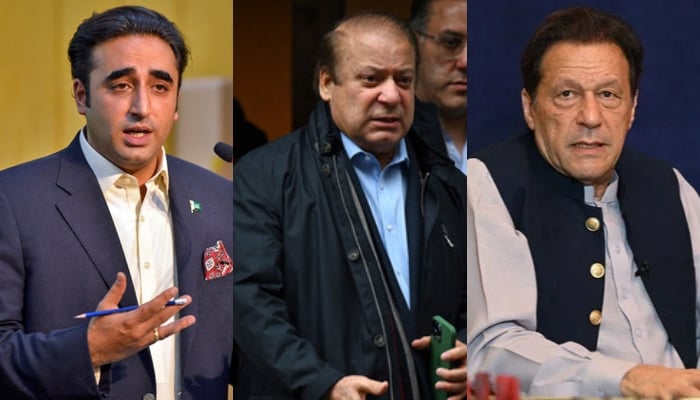Election 2024: Here's an overview of PPP, PML-N, PTI manifestos
PILAP highlights agendas of each party contained in its election manifesto 2024 related to key focus areas
With the general elections 2024 just around the corner, the Public Interest Law Association of Pakistan (PILAP) has released a premier providing an overview of the manifestos of the country's three major political parties contesting the February 8 polls.
PILAP, which is an independent, non-political, and non-profit organisation, has given an overview of the manifestos of Pakistan Muslim League Nawaz (PML-N), Pakistan People’s Party (PPP), and Pakistan Tehreek-e-Insaf (PTI).
In its primer, PILAP has highlighted the agendas of each party contained in its election manifesto 2024 in the document, with regard to key focus areas.
Why vote?
Voting is a vital part of the democratic process. The right to political expression is a fundamental right guaranteed to all citizens in the Constitution.
Elections give the citizenry a regularly mandated chance to participate in the political process to uphold greater transparency in public affairs, improve governance, and shape the making of sound economic decisions and other social and political policies.
Nothing but the will of the people should give legitimacy to a sovereign democratic state. This makes a citizen’s vote not just a right but also a responsibility. Your vote is indeed an opportunity to elect representatives, but it is also the only way to ensure the doors of accountability are open. We urge you to exercise your right to vote and do so as wisely as you can.
Here are the summaries of the parties manifestos.
PML-N
PML-N's focus remains on economic growth, structural reforms, energy development, and infrastructure expansion. The Shehbaz Sharif-led party vows to bring down the inflation and unemployment rates by creating at least 10 million jobs while also bringing the poverty level down to 25% from 38% in five years.
It has set a target of 6% GDP growth, annual exports of $60 billion, and $40 billion in yearly remittances from expatriates.
PML-N aims to reduce electricity bills by 20-30%. They further pledge to add 15,000MW to the national grid and implement a nationwide 10,000MW solar power initiative.
The party also alluded to its plans to ensure closer ties with China and reduced taxes for industries while ensuring an increase in the tax-to-GDP ratio from 10.4% to 13.5% by the end of the year 2029, along with the privatisation of loss-making State-Owned Enterprises (SOEs).
PML-N’s reform agenda includes a promise to abolish the National Accountability Bureau (NAB) and to restore Articles 62 and 63 of the Constitution (Disqualifications for membership of Majlis-e-Shoora) to their original form.
PPP
PPP’s election manifesto heavily focuses on social protection for the poor including programmess targeting poverty and hunger alleviation, measures to protect the rights of minorities and marginalised groups, and an emphasis on strengthening the federation.
PPP proposes five pillars of a new people’s economy — economic stability, increment in public and private investment, protection of vulnerable, addressing of fiscal imbalances, and management of debt and external resources.
Some of the key takeaways from the manifesto are real incomes for wage earners to be doubled in five years, provision of 300 free units of electricity for the poorest consumers, harnessing of solar and wind energy, construction of three million houses for women heads of households, provision of free primary healthcare, kissan/hari cards for agriculture workers, mazdoor cards for laborer, youth cards for young people, introduction of a Right to Food Act in parliament, and establishment of a free 1000-day nutritional program for expectant/new mothers.
PPP hopes to fund these programmess by abolishing 17 federal ministries found redundant following the 18th Amendment, saving Rs300 billion annually as well as by eliminating subsidies. PPP has pledged to protect the 18th Amendment and expand its implementation, criminalise enforced disappearances, hold intelligence agencies accountable, and repeal discriminatory and outdated colonial laws, including revisiting Clause 2 (1)(d) of the Army Act. Special emphasis has been given to a climate-resilient future.
PTI
PTI’s manifesto refers to the creation of a state that embodies the spirit of Madinah and is imbued with Islamic values and an Islamic welfare system. PTI has focused on the rule of law, governance, justice, and accountability.
PTI proposes constitutional amendments to revise the process of the prime minister’s election (direct election by voters rather than MNAs), reduce the tenure of the National Assembly to four years, reduce the tenure of the Senate to five years, and revise the process of the election of Senators (50% elected directly and 50% indirectly).
Furthermore, PTI has pledged to establish a "Truth and Reconciliation Commission" to heal the country by bridging its divides. Other commitments made by PTI include reforms aimed at broadening the tax net, expanding the Sehat Card for the provision of free healthcare across Pakistan, reinstating the Ehsaas programme, and introducing a uniform education system across the country.
Special emphasis has been given to accountability across the board including efficient handling of white-collar crimes, creation of provincial anti-corruption forces, and establishment of an elite anti-corruption academy.
-
Security forces gun down 30 terrorists in multiple IBOs in KP: ISPR
-
MQM-P calls for new province in Sindh
-
US report validates Pakistan military edge over India: PM
-
Banned TTP poses serious threat to Pakistan security: UNSC panel
-
CM Afridi clarifies remarks on by-poll after ECP requests army deployment
-
Dubai sees 3.2m Pakistani passengers in 2025 as airport sets new milestone
-
Security forces kill 23 Indian proxy terrorists in KP's Kurram
-
Pakistan to construct island to boost oil exploration: report












